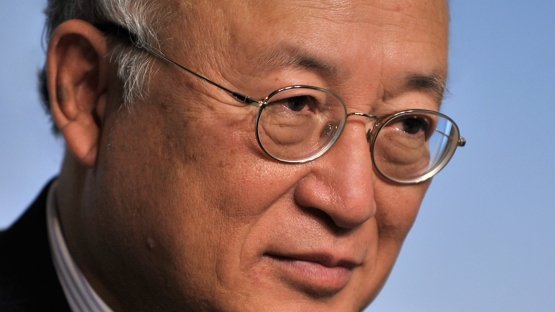Good afternoon, Ladies and Gentlemen.
I am very pleased to visit Tata Memorial Centre and to have a chance to learn about the impressive work that is being done here.
This institution is widely recognised both as a centre of excellence in the treatment of cancer, and for the high quality of its research. You also have a well-established relationship with the International Atomic Energy Agency.
The IAEA has a statutory objective "to accelerate and enlarge the contribution of atomic energy to peace, health and prosperity throughout the world." I feel that our mandate could be best understood today as Atoms for Peace and Development.
We help to make nuclear science and technology available in areas such as electricity generation, human and animal health and food production.
One of the most important areas of our work is cancer control. India has been a generous supporter. It has supplied Bhabhatron II radiotherapy machines to a number of countries through the IAEA.
Indian cancer specialists, including from Tata Memorial Centre, have made important contributions to IAEA research and publications, for example in clinical radiation oncology.
Ladies and Gentlemen,
Cancer is reaching epidemic proportions in developing countries, but many lack the resources to deal with it. Several dozen African nations have absolutely no radiotherapy facilities.
This means that many thousands of people die of cancers which could be managed effectively, or even cured, if they lived in countries with the right facilities. This is a great tragedy.
By 2020, it is estimated that over 10 million people will die of cancer around the world each year.
Last month, we marked World Cancer Day with a special event at IAEA headquarters in Vienna. The theme was Not Beyond Us.
I expressed my belief that there is good reason to hope that fighting cancer is not beyond us. Great progress has been made against cancer in recent decades. Some cancers which were once almost always fatal can now be cured.
Rapid advances are being made in areas such as medical imaging. Radiotherapy is becoming ever more accurate and precise.
However, developed countries have been the main beneficiaries of these positive trends. Too many developing countries lack the facilities and expert personnel needed to respond to the cancer challenge.
The IAEA has been working for decades with a global network of partners such as the World Health Organization to help countries establish comprehensive cancer control programmes that cover diagnosis, treatment and palliative care.
Our Programme of Action for Cancer Therapy – PACT – helps countries to use limited resources more effectively. PACT also seeks to raise global awareness of the challenge of cancer throughout the developing world.
Through our technical cooperation programme, we are supporting some 160 cancer projects around the world, mainly in low- and middle-income countries.
We help countries to establish oncology and radiotherapy centres. We provide extensive training for medical and technical staff. We support the establishment of nuclear medicine facilities for diagnostics.
The Agency makes full use of modern technology in helping to share knowledge and experience among medical practitioners.
To take one example – you are undoubtedly familiar with the concept of a tumour board. This involves a number of doctors, who are experts in different medical specialties, coming together to discuss the condition of an individual patient and consider the best treatment options.
The African Radiation Oncology Network (Afro-NET), which was established by the IAEA's Division of Human Health, enables doctors to conduct tumour boards online, in real time.
That means physicians from Canada, the United States and African countries – for example – can get together to discuss the appropriate care for a patient.
They can review X-rays, scans and biopsy slides – just as if they were in the same room, instead of on different continents. This service can be accessed on mobile phones as well.
Similarly, through the IAEA Human Health Campus, we offer complete, interactive online training courses in radiation oncology, physics, nutrition and nuclear medicine.
All of this helps developing countries to build up the well trained, multi-disciplinary, professional teams needed for a sustainable cancer programme.
Ladies and Gentlemen,
I am proud of the work which the IAEA does in the cancer area. It really does save lives.
I also greatly value our cooperation with India and with leading institutions such as Tata Memorial Centre.
I hope to strengthen and deepen that partnership in the coming decades with the goal of ensuring that, one day, all patients, in all countries, will have access to the highest standards of cancer care.
Thank you.


